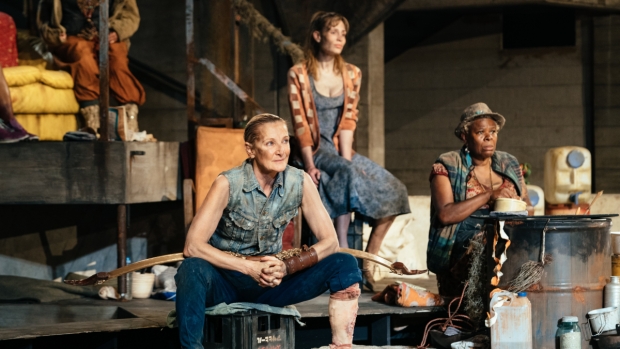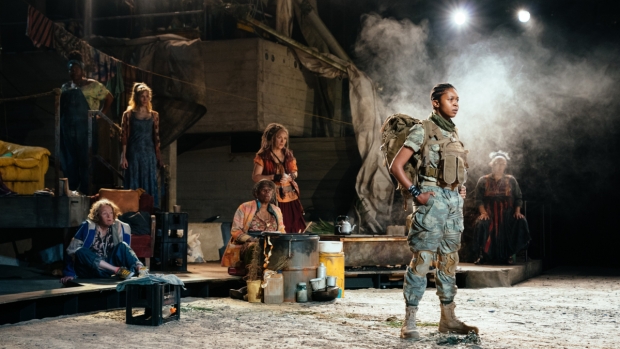Paradise at the National Theatre – review

© Helen Murray
Lesley Sharp gives a towering performance as the abandoned war veteran at the heart of Kae Tempest's stirring reimagining of Sophocles' Philoctetes. Limping around the stage like a wounded crab, Sharp's cockney loner rails against the world and, more specifically, Odysseus (Anastasia Hille), who has come to lure him back to the frontline from the island where he dumped him a decade previously.
"Don't get smart with me boy," he chastises Neoptolemus (Gloria Obianyo), the son of Achilles working under orders from Odysseus, when he corrects him for mixing idioms. But he soon develops a paternal fondness for the son of his fallen friend, even if he suspects him of trickery. There is warmth beneath the grizzled, weather-beaten exterior.
"Everyone suffers but he dwells, that's his problem, he's a dweller," comments a member of the (superb) all-female chorus, wives of soldiers sent to war, on Philoctetes' state of mind. It's just one of countless linguistic flourishes that pepper Tempest's adaptation, which will feel familiar to fans of their work. As one might expect it has a strong poetic rhythm, particularly in the opening and closing songs of Aunty (Eska), who foretells the coming of Odysseus and the island's lost paradise ("Her teeth are exploded dynamite… A shadow of her former might").
Ian Rickson's staging, continuing the Olivier's in-the-round configuration, could be called static, but then Tempest's text is so lean and dynamic that it barely matters. And the action when it comes happens in intense bursts, whether it's the convulsions of Philoctetes, clutching his gangrenous leg, or the climactic firing of his legendary bow.
Sharp, who requested to play the role having taken part in a workshop (Philoctetes was originally due to be played by a man), is clearly having the time of her life. She stalks around the stage dropping f- and c- bombs, at one point delivering an impassioned monologue on the hellish state of the country, with its racism scarring "like a welt", that prompts a round of applause.

© Helen Murray
She is ably matched by Obianyo, whose nervy, naive Neoptolemus makes for an ideal foil, and the clipped, officer-class Odysseus of Hille, shamelessly cajoling his old comrade back to a certain fate on the frontline.
Rae Smith's sand-floored set effectively evokes the island setting and its undertones of ecological disaster. The chorus are arranged up the sides, meaning they can heckle like a terraced sports crowd ("keep your bloody hair on!") though it also means some of those in the stalls lose them visually.
This is not a play that wears its politics lightly. The notion of being stranded on an island has obvious resonances – needless to say, the title is laden with irony – and lines such as "I hear people are starving in your land of hope and glory" could hardly be more on the nose. But there is plenty of humour too. When Odysseus is offered oregano as a treatment for his wound, he retorts "I'm not a fucking pizza". The nearly two hour running time zips by.
Tempest channels all the ennui and anger of the post-Brexit, illness-scarred landscape, and retells Philoctetes as a parable of contemporary isolation. It's a world where modern military uniforms and references to technology sit alongside fire pits and wooden bows. The ancient and the new, stranded together.










